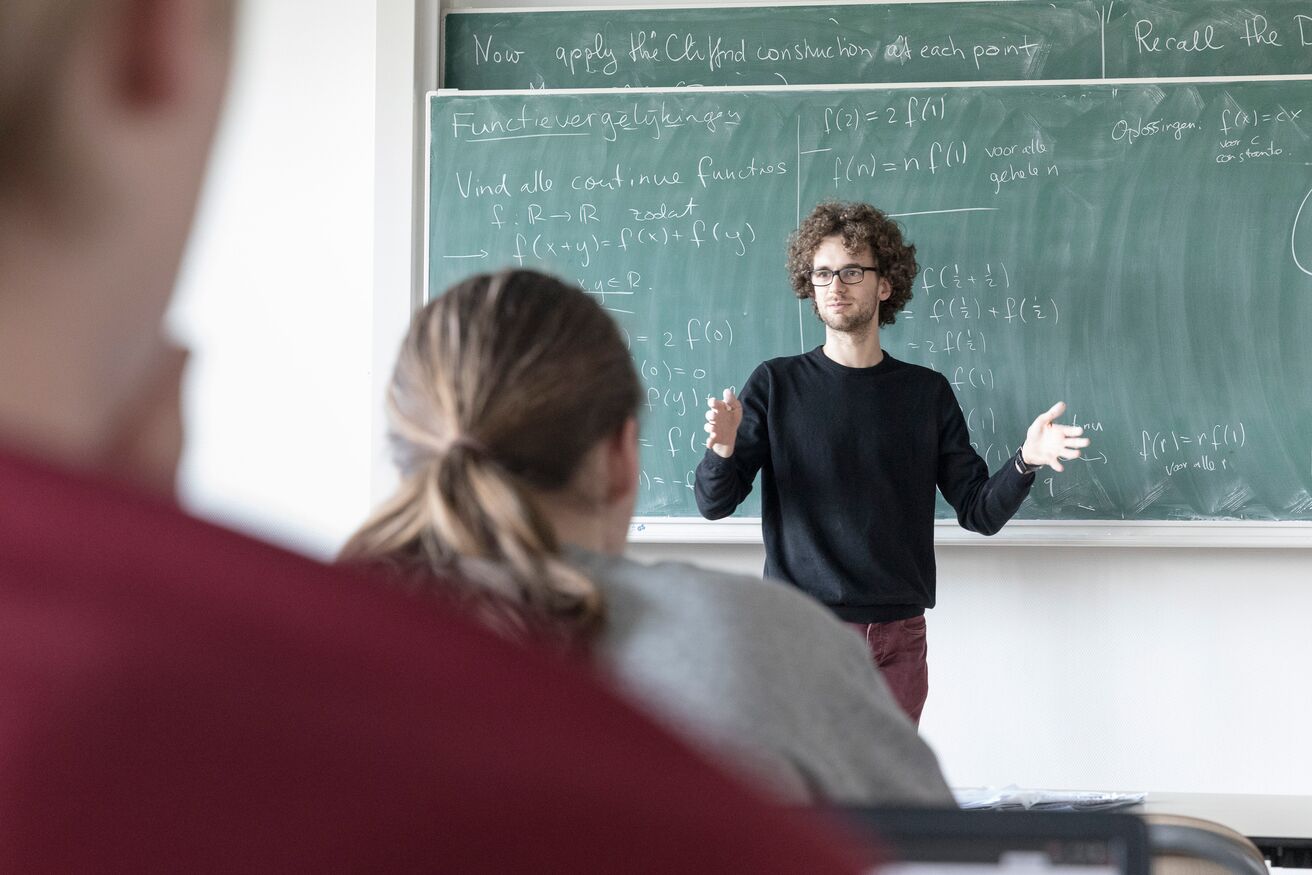
Professional consultation
Specific questions about your teaching?
As a lecturer, you sometimes have specific questions about your teaching, but don’t want to follow an entire training course or module to get the answers you need. A consultancy or tailor-made workshop could help you get the answers you’re looking for, at a moment that suits you best. TLC Science is happy to provide you with advice.
Your question can be about anything teaching-related. For example; How do I create good exam questions? How can I integrate a blended approach in my curriculum? How can I use educational tools in my course?
How does it work?
First, we schedule a short meeting with you to find out exactly what your question is. Next, we discuss internally how best to address your question or problem and schedule a consultation meeting or tailored-made workshop with you (and colleagues, if necessary), at a moment that suits you best.
Tailored advice
For teams of lecturers who want to change their curriculum.
Do you want to revise your curriculum? For example, by changing the structure of the curriculum, integrating a blended or hybrid approach, future-proofing the curriculum, integrating soft skills throughout the whole curriculum, etc. Then please feel free to contact us for didactical support. This is not a workshop, but customised advice for your specific situation.
For lecturers who want to revise their course and are in need of tailored advice.
Are you planning to revise your course, for example by integrating more activating work formats, blended learning or changing your assessment activities? Then you can contact us for advice and support. This is not a workshop, but customised advice for your specific situation. If you are looking for an existing workshop, you can follow one of our pre-BKO or BKO modules about designing a course.
For lecturers who have a specific question about one of the educational tools that they can use in their teaching.
As a lecturer at the Faculty of Science, you can use multiple educational tools in your course. For example, tools to manage your course (Canvas), organise digital assessment (TestVision, SOWISO, ANS), stimulate deeper learning and good preparation (FeedbackFruits, Perusall, LabBuddy, CodeGrade, eJournal), and stimulate interactivity in class (Wooclap). If you are interested in using one of these tools in your course, if you want more information, or if you have a specific question about one of these tools, then please feel free to contact us.
For lecturers who have a specific question about implementing blended learning in their course.
If you’re interested in implementing blended learning in your course and need advice about your course design, work formats or educational tools, you can contact us. This is not a workshop, but customised advice for your specific situation.
For all program directors and lecturers who want to broaden their understanding in creating an inclusive learning environment.
Learning happens best when we feel we belong. Therefore, creating an inclusive learning environment is key. But how can you create such an environment? Why is it important to reflect on your own positionality as a teacher? And how can you transfer from equity to inclusivity? Or maybe you want to incorporate the different perspectives of your students more in your curriculum (International Classroom)? Or you have questions on how to make your educational materials better accessible to everyone? This topic can raise a diverse range of questions. Please feel free to contact us for customised advice to your specific situation.
If you would like to follow a workshop with other teachers on how to create an inclusive environment and practice you teaching skills on dealing with hot moments in the classroom you are very welcome in the TLC module An inclusive learning environment.
Workshops on request
For teams (consisting of the program director and learning trajectory coordinators or senior lecturers) who want to visualise and strengthen the cohesion and structure of their curriculum by aligning the learning objectives, learning trajectories and exit qualifications of their curriculum.
Do you want to improve and visualize the structure and cohesion of a curriculum for students. teachers and visitation committees? With the Visible Learning Trajectories Program, Bachelor’s programs are able to realize and visualize this goal in a structured and effective manner with the Visible Learning Trajectories Tool. All Bachelor’s programs of the UvA are able to take part in the Visual Learning Trajectories program. After a successful implementation of the project in most Bachelor’s programs of the FNWI, the program will be offered UvA-wide in the next five years. The program contributes to the improvement of the quality of education at the UvA. More information.
For teams (consisting of the program director, program coordinator, course coordinators of the program, and lecturers) who want to align their assessment and teaching activities at curriculum level.
The ZOT project focuses on embedding the didactic principles of the program in education and creating a constructive and coherent curriculum by aligning assessment and teaching activities at curriculum level. The project builds on the Visible Learning Trajectories project in which course objectives, learning trajectory objectives and exit qualifications are optimally aligned and visualized. Together, the Visible Learning Trajectories and ZOT project result in optimal constructive alignment at curriculum level. More information.
For course coordinators and lecturers who are interested in assessment of academic and research skills.
During two meetings, we will get started with the construction or improvement of a rubric for an assignment in your course. We develop the rubric as a model for feed-up, feedback and feedforward. The first meeting is about the role which a rubric can play in assessment of and for learning and how rubrics can be used in your teaching. You will prepare to construct or improve your own rubric. At the second meeting, we will continue with constructing or improving your rubric. With peer feedback we are going to make the rubrics more reliable. Furthermore, topics that will be discussed are: Increasing the reliability of your rubrics, joining several rubrics within a subject, learning trajectory or curriculum and using rubrics to improve your teaching.
For teacher teams (consisting of course/practical/skills coordinators) who want to improve and align the rubrics in their curriculum.
During two meetings, we will get started with the improvement and fine-tuning of the rubrics in your curriculum. The first meeting is about the success criteria of a good rubric and starting to review and improve your current rubrics. At the second meeting, we will continue with improving your rubrics. Furthermore, topics that will be discussed are: Increasing the reliability of your rubrics and the alignment of rubrics between lecturers and courses in your curriculum.
For lecturers who want to improve their exam questions and align their assessment methods to their learning objectives.
During the first part of the workshop, we will address how to create good exam questions. Topics that will be discussed include: How are MC questions and open-ended questions constructed, how many answering options should there be, and how to use an answering model? During the second part, you will review your own exam questions and check if they align with the learning objectives of your course.
For teams (consisting of the program director and lecturers) who want to review or implement self-directed learning in their curriculum.
During this workshop, we will discuss the aims of your programme regarding self-directed learning. How much freedom do your students have? What should be the level at the end of the curriculum? How should the curriculum build up towards this level? Then, we will take inventory of where and to what extent self-directed learning is incorporated in your curriculum and analyse how this can be improved to work towards your aims.





